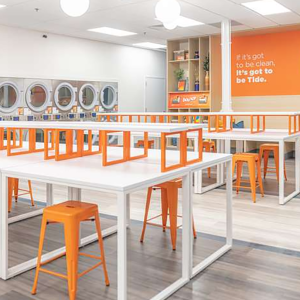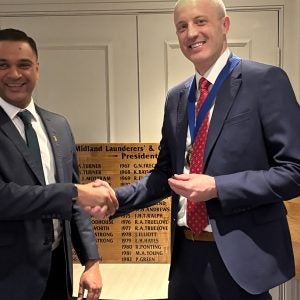UK
The Textile Services Association (TSA) annual National Congress in Edinburgh got under way on Thursday 9 February and there was plenty for CEO David Stevens to report on, from lobbying the Government for more help in the energy crisis, through rocketing costs, the labour shortage, training programmes to positive initiatives on mental health and sustainability strategies. There was also a cracking list of speakers and presenters lined up for the event with former Prime Minister Gordon Brown topping the list.
TSA Chairman Charlie Betteridge kicked off the proceedings with his welcome to delegates during which he referred to the previous year of uncertainty saying that the new wave of covid (Omicron), Ukraine and the subsequent huge increase in energy prices have added major costs to the industry. “We needed guidance from the Government. We had no idea what support we would get and we knew we needed it.” On top of that 2022, he added, saw a lot of activity that didn’t help matters for an industry already challenged with the above. Eco activists caused more unnecessary disruption whole Q4 saw the highest inflation since 1975 and the largest employment since 1974. Widespread industrial action caused more uncertainty.
Betteridge reported that labour shortages are the same for the UK as they are across Europe as Eastern European workers have gone back home. It is not to do with whether or not they can get visas to the UK, he explained, for, example Czech unemployment is around 2+%. a recent European Textile Services Association (ETSA) survey found that for 20-25 year olds laundry was right down right down their career wish list. A recent French conference found prospective employees were looking for sustainability. “We know we are a green industry but we are not getting that message across,” said Betteridge.
As supply, globally, he reckons, availability was better in 2022 except for electronics and a big trouble last year was cost. “Everything became more expensive,” he commented. “The most important kpi was inflation. We needed double digit price rises [for laundry services] and we couldn’t do it.
“Before I put the last nail in the coffin of 2022 let me mention mental health awareness which TSA has been promoting, first with an excellent seminar last year. For example, it can take two years until people admit financial problems. Lots of people in your laundries are not thinking about feeding and folding but about how they are going to make ends meet at home. Our managers are feeling the pressure as they are urged to cut back be more efficient and good longstanding relationships with customers are under strain. We need to be aware of what we do. Get in touch with TSA to find out more.”
All in all it was not a great scenario in 2022, admitted Betteridge. “The big thing, however, is TSA and what it is doing…it is in a good place and offering great value to members.
No uncertainty
“This year will be difficult. We are certain of that – so there is no uncertainty. We have become more resilient. We know supply chain prices will go up. So do our customers. Industrial action will affect us, bad debt provision is also something that may become problem. If our customer’s biggest customer’s biggest customer goes down, you have a problem. Inflation is our biggest enemy. I will repeat…we have got this far, we will get through it. This time next year take a big breath, give a big sigh of relief and say ‘we have got through it’.
LOOK WHO'S TALKING: Speakers at the TSA Congress 2023 were, from left to right, back row: Sir John Curtice, Professor of Politics at Strathclyde University in Glasgow; ex- Primie Minister Gordon Brown; TSA CEO, David Stevens; TSA chair, Charlie Betteridge. Front row: TSA technical officer, Shyju Skariah; TSA director (Finance & Membership) Emma Andersson; Pauline Buchan, CEO of the Cottage Family Centre in Fife; De Montfort University’s Dr Katie Reid; and, well-being expert, Anna Neubert-Wood.
• Look out for more reports on the Congress presentations, including David Stevens' address






